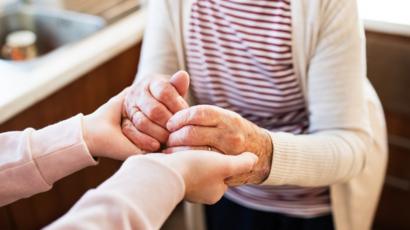Experiencing symptoms of anxiety is normal from time to time, however the amount and severity can be different from person to person. Anxiety is generally characterised by a subjectively unsettling feeling of concern or worry, displayed by:
-
a worried facial expression
-
increased muscle tension
-
restlessness
-
impaired concentration
-
sleep disturbances
-
irritability
Anxiety can worsen over time, sometimes becoming so severe that it interferes with your daily life. When this happens, it is said that you have an anxiety disorder.

Common symptoms of anxiety (what the person is experiencing):
-
nervousness or restlessness
-
rapid heart rate
-
rapid breathing or feeling of shortness of breath
-
increased or heavy sweating
-
trembling or muscle twitching
-
weakness and lethargy
-
difficulty focusing or thinking clearly about anything other than the thing you’re worried about
-
insomnia
-
digestive or gastrointestinal problems
What you should do
Try to understand that what they are experiencing might not make sense to both you or them: Anxiety can sometimes be unpredictable and without an actual cause or trigger. It is important to identify the symptoms and provide help when needed as soon as possible to prevent worsening of condition.
Ask how you can help and respect their needs: Listen to what they need at the moment, even though it might not be what you are expecting or does not go according to your plan
Validate their distress: Make them understand that it is okay to talk it out, and it will not be judged or disapproved.
Help them stay grounded (e.g. providing physical touches, encouraging movement and stretching, encouraging them to repeat a soothing or helpful phrase): Grounding techniques help to shift their focus and attention to what is actually happening, rather than the fear and anxiety.
Prioritise action over words: Try prompting them about what they need, instead of giving advice or saying things to make them feel better.
What you should not say
Here are certain things that you would want to say, thinking that you are able to talk the person out or convince the person to not feel that way. However, it is best to not make the person feel that their feelings of anxiousness are not valid and that they are wrong. These are the things to avoid saying when dealing with a person experiencing anxiety:
-
“It’s all in your head.”
-
“Calm down, you’re overreacting/overthinking.”
-
“We all get stressed sometimes.”
-
“There’s nothing to worry about.”
-
“It’s not a big deal! Get over it!”
-
“You’re just making excuses.”
-
“Don’t overanalyse it.”

Image credit: BBC
Anxiety can lead to real illness when it is not dealt with correctly. Show patience and care to the ones you love and give them the support that they need.
References:
- https://www.healthline.com/health/how-to-help-someone-having-a-panic-attack#focus-on-actions
- https://www.healthline.com/health/anxiety-symptoms#symptoms
Cover image credit: Aruma








